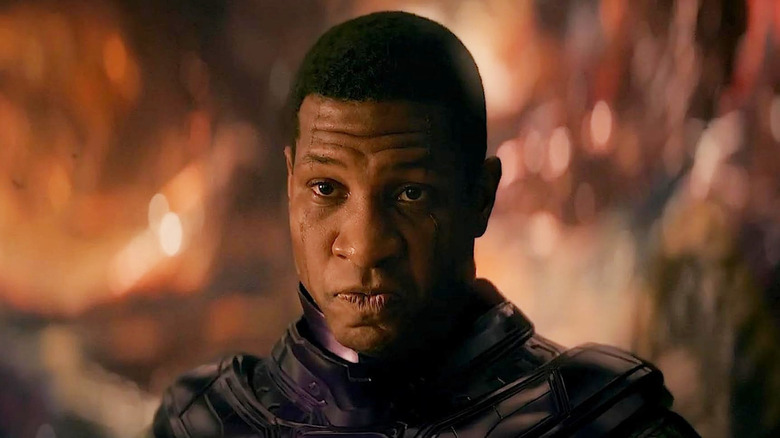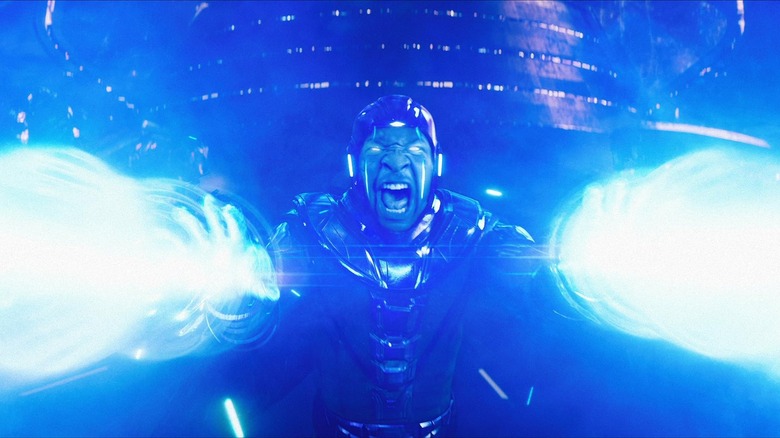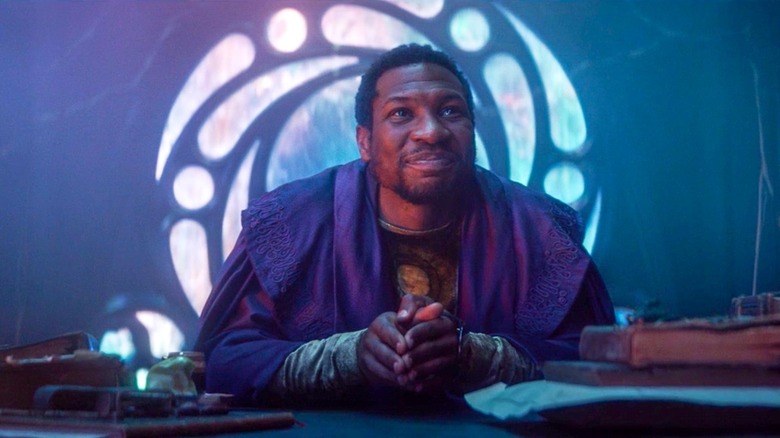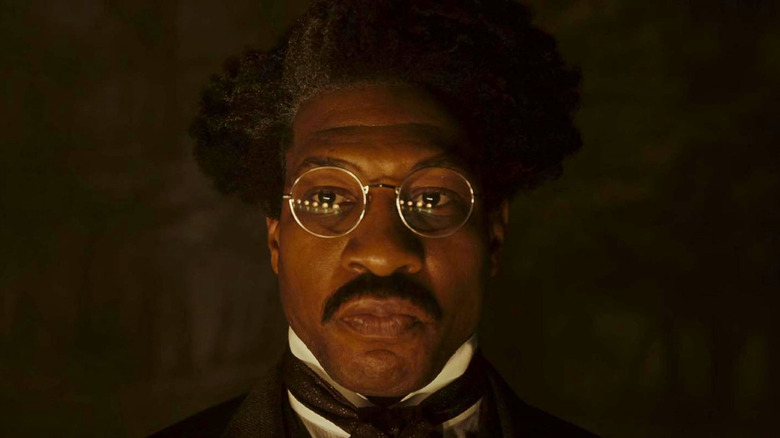How The Marvel Cinematic Universe Moves Forward Without Jonathan Majors
At the risk of being hyperbolic, 2023 has been a pretty terrible, horrible, no good, very bad year for Marvel Studios. The Marvel Cinematic Universe suffered its biggest box office flop ever with "The Marvels"; the "Secret Invasion" series was the worst-reviewed MCU entry ever and drew middling viewership; and audiences mostly shrugged off "Ant-Man and the Wasp: Quantumania," along with its attempts to tee up interest in the MCU's Multiverse Saga. That's on top of all the bad buzz from reports about the House of Ideas' behind-the-scenes woes, the departure of longtime Marvel Studios executive Victoria Alonso (yes, that also happened this year), and the general opinion that Marvel Studios has released too much of questionable quality too quickly of late, even by its standards.
Naturally, however, all of this pales in importance compared to the Jonathan Majors situation. What was once set to be the "Lovecraft Country" and "Creed III" actor's big year came grinding to a halt when he was arrested in New York City and charged with the assault, harassment, and strangulation of his former partner Grace Jabbari back in March. Having already been cast as the MCU's next Thanos-level threat, Kang the Conqueror and his many variants, the distressing criminal allegations around Majors (coupled with subsequent reports detailing allegations of abusive behavior dating back a decade) loomed heavy over his MCU appearances this year. It also, obviously, made any speculation about his future with the franchise an incredibly delicate and sensitive topic to broach.
Unsurprisingly, Disney/Marvel fired Majors almost immediately after a New York jury found him guilty of harassment and assault in the third degree this week. So, now that the MCU is officially moving on without him, it asks the billion dollar question: What exactly is the best path forward here?
The roadmap to the MCU's Multiverse Saga
Think back to the MCU's Infinity Saga and you may recall the road to "Avengers: Endgame" wasn't always smooth. From unflattering responses to films like "Iron Man 2" and "Thor: The Dark World" to the creative clash between Marvel Studios and Edward Norton on the financial misfire that was "The Incredible Hulk" (and the way it gave rise to Marvel Studios' conveyor belt approach to filmmaking, which is also to blame for a lot of its ongoing problems), the House of Ideas has always played things by ear when it comes to what works and what doesn't work in the MCU.
Nevertheless, the Multiverse Saga feels disorganized in a way the Infinity Saga did not. It's partly because audiences are wiser to the MCU's tricks now and can see past the smoke and mirrors to recognize how disorganized things are, but it's also because the franchise has just gotten too big for Marvel Studios' old way of doing things to keep working as they once did. The irony, of course, is that the same disorganization that's caused so much trouble for the MCU this year might also be the thing that makes it easier for the franchise to leave Majors in the review mirror. In fact, the lack of clarity surrounding the Multiverse Saga and what it's building toward makes this the perfect time for Marvel to evolve and chart a different course.
Marvel Studios may be thinking along those very lines, as evidenced by the rumors it could potentially shift away from Kang to focus on a different classic Marvel villain in Doctor Doom. It might not require the studio to soft-reboot its non-Kang plans either, given how disconnected much of what's happened in the Multiverse Saga has been from Kang.
Meet Kang's OTHER other variants
Occam's Razor dictates the simplest solution is often the best one, and there's certainly a simpler one here than tossing out Kang. Instead, Marvel Studios could merely recast the role. After all, it wouldn't be the first time it happened, be it due to creative differences, salary disputes, or just scheduling conflicts. If audiences can roll with James Rhodes being played by Don Cheadle rather than Terrence Howard or Mark Ruffalo playing Bruce Banner instead of Edward Norton or even Zachary Levi taking over as Fandral from Joshua Dallas (a change that, let's be real, most people probably missed entirely), they can handle Kang suddenly being portrayed by someone other than Jonathan Majors.
In yet another ironic twist, you couldn't ask for a better Marvel baddie to recast than Kang. True, there's the awkwardness of having to explain why there's no longer a single Kang variant in the multiverse that looks like Jonathan Majors — an idea that runs contrary to the version of the Council of Kangs from the "Quantumania" mid-credits scene — but it's nothing a few lines of exposition can't handwave away ... assuming it's not outright ignored (it wouldn't the first time!). Alternatively, the MCU could nod to the recasting without explicitly acknowledging it and then quickly move on, much like what transpired when Cheadle took over playing Rhodes in "Iron Man 2." The big thing there would to be avoid doing so in a way that feels insensitive or makes light of the real-world situation with Majors.
At the end of the day, the only rules that govern the multiverse are the ones Marvel Studios decides on. If Peter Parker's variants can look like completely different people in "Spider-Man: No Way Home," there's no reason Kang's variants can't follow suit.
Forget it, Kevin – it's the multiverse
There's also a third and possibly even stickier solution. At the end of "Loki" season 2, the Time Variance Authority seems positively unworried about the threat posed by Kang. Agent Mobius (Owen Wilson) casually refers to the villain's variant featured in "Quantumania" as having been "dealt with" and goes about his day, business as usual. By that point, the Kang variant known as He Who Remains is similarly dead and the Victor Timely variant at the heart of all the trouble in season 2 is no longer a concern. It's almost like the show is saying Kang doesn't matter. Perhaps the larger MCU should follow its lead?
Think about it. Thanos wasn't always the overarching villain of the Infinity Saga, so why does Kang have to be the big bad of the Multiverse Saga? Perhaps the MCU would be better off just ignoring the villain altogether, as opposed to recasting him or trying to replace him with the likes of Doctor Doom. Is it so inconceivable that something could transpire in the multiverse, wiping out Kang and his many, many variants with one swift stroke? It may not be the most narratively satisfying solution that Marvel Studios boss Kevin Feige and his fellow creatives could go with, but then again, are audiences that invested in seeing the "Quantumania" post-credits scene paid off anyway?
The box office returns don't indicate so. If anything, the failure of "Quantumania," "Secret Invasion," and "The Marvels" suggest people want less MCU homework to do, not more. Maybe Marvel Studios should give them what they want and prioritize making the franchise connected in new and exciting ways rather than continue trying to chase the ghost of the past. If not now (when it has every excuse to), then when?



